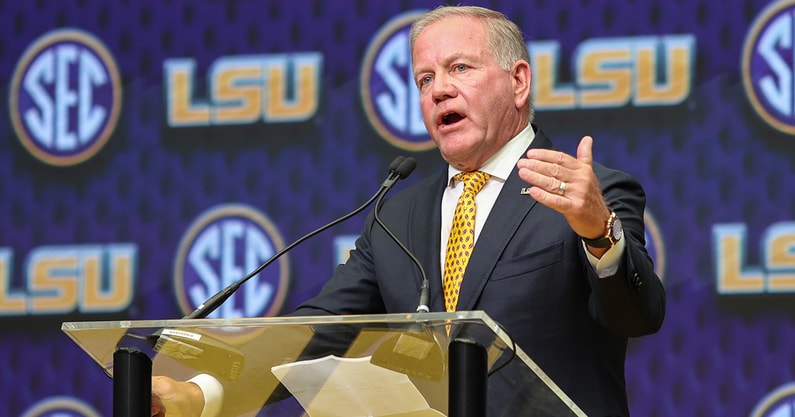
Brian Kelly, the head coach of LSU football, recently shared his thoughts on the evolving landscape of college athletics, specifically addressing the Name, Image, and Likeness (NIL) policies in light of the ongoing discussions around revenue sharing. His comments reflected not only acceptance of the new reality but also a firm stance that NIL is here to stay—and for good reason.
In a candid discussion, Kelly acknowledged that the era of amateurism in college sports has undergone a dramatic shift. With athletes now able to legally profit from their personal brand, the dynamic between programs, players, and the broader business side of college sports has transformed significantly. “It’s not going away, nor should it,” Kelly stated, emphasizing his belief that athletes deserve to benefit from the immense revenue they help generate.
Kelly has long been considered one of the more pragmatic and forward-thinking voices among Power Five coaches. His position on NIL continues that reputation. Rather than push back against the movement, he’s focused on ensuring LSU and its athletes are equipped to thrive within it. He highlighted the importance of structure, regulation, and education to ensure NIL is implemented fairly and sustainably.
As NIL moves into what many are calling the “revenue-sharing era,” the conversation has shifted from whether college athletes should be compensated, to how it can be done effectively. Some schools and conferences are exploring direct revenue-sharing models where athletes receive a cut of media rights and other income streams. While these models are still in the early stages, Kelly is already thinking ahead.
“We’ve got to build a framework that protects the interests of our student-athletes but also maintains the integrity of college sports,” Kelly said. He pointed to the need for transparency, compliance systems, and support staff that can help players navigate contracts, taxes, and long-term planning. LSU has reportedly already invested in strengthening these support areas.
But Kelly also acknowledged the growing pains. The early NIL landscape has been marked by inconsistencies, with different rules across states and institutions. Additionally, some schools have used NIL as a thinly veiled recruiting incentive, leading to accusations of pay-for-play, which is still technically prohibited under NCAA rules. Kelly stressed the importance of federal legislation or a national standard to create a more level playing field.
At the same time, he praised the impact NIL has had on players’ lives. Many athletes, not just stars, have earned life-changing income, allowing them to support their families, invest in their futures, and build financial literacy skills while still in college. He cited examples of players using their earnings to start businesses, fund charitable efforts, or pursue advanced degrees.
Kelly’s comments reflect the increasing realism among college coaches. In the past, some coaches resisted NIL, worrying it would disrupt locker rooms, complicate recruiting, or undermine traditional team structures. But Kelly believes those concerns can be managed with leadership, education, and open communication.
“We’re preparing young men not just to play football, but to succeed in life. NIL is part of that now,” he explained. “If we do this the right way, it can be a positive force—not a distraction.”
As LSU continues to compete at the highest level, Kelly’s approach could serve as a blueprint for other programs navigating the new NIL landscape. Rather than fighting change, he’s embracing it, shaping it, and leading with a focus on fairness, structure, and opportunity. For Brian Kelly, NIL is not just a trend—it’s a necessary evolution.






